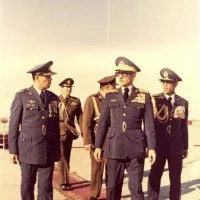Mohammed Reza Pahlavi, the Shah of Iran, departed Iran on January 16, 1979, fleeing political unrest led by the Ayatollah Khomeini and seeking medical treatment for lymphoma. Pahlavi first flew to Aswan, Egypt, where Anwar Sadat welcomed him, and would spend the next ten months moving among Morocco, Mexico, the Bahamas and Panama while requesting… Read More "Admitting the Shah to the U.S.: Every Form of Refuge has its Price"
Voyage to the Bottom of the Sea — The CIA Mission to Raise a Soviet Sub
In March 1968, a K-129 Soviet nuclear submarine cruising in the Pacific Ocean mysteriously disappeared from Russian radar. Following an unsuccessful search by the USSR, the United States, using sonic triangulation, secretly located the sunken submarine 1500 miles northwest of Hawaii. An operation was proposed to deploy a ship to recover the wreck of the K-129,… Read More "Voyage to the Bottom of the Sea — The CIA Mission to Raise a Soviet Sub"
China’s Fight for Tiny Islands — The Taiwan Straits Crises, 1954-58
Recent disagreements over Beijing’s claim to the South China Seas (in which a tribunal constituted under the UN Convention on the Law of the Sea issued a non-binding decision in July 2016 in favor of the Philippines) in many ways is reminiscent of the potentially far more serious clashes over the Taiwan Straits, the first of… Read More "China’s Fight for Tiny Islands — The Taiwan Straits Crises, 1954-58"
Mohammad Reza Pahlavi, the Shah of Iran, departed Tehran on January 16, 1979 to seek medical treatment and to escape growing political unrest in the country he ruled. The Shah had consolidated his hold on power after the 1953 U.S.-backed overthrow of Mohammad Mossadegh and was considered a vital ally to the U.S., a leader… Read More "Finale of the Persian Monarchy and Prelude to the Iranian Revolution"
Persistence, Vision and Luck: Creating a Center for Diplomatic Training
Can you imagine the bureaucratic struggles involved in persuading the Department of Defense to hand over acres of prime real estate for a State Department training facility and then convincing Congress to authorize the transfer? This impossible dream was accomplished thanks to vision, persistence and a large dose of luck by a small group of… Read More "Persistence, Vision and Luck: Creating a Center for Diplomatic Training"
Agent Orange and the Vietnam War
In 1961, United States forces in Vietnam began to use chemical herbicides and defoliants on South Vietnamese crops, bushes, and trees in order to deprive the Vietcong of both food and cover for ambushes. Code-named Operation Ranch Hand, the campaign used a variety of herbicides but the most commonly used, and most effective, was Agent… Read More "Agent Orange and the Vietnam War"
Bad Blood: The Sino-Soviet Split and the U.S. Normalization with China
In the 1960s, in the depths of the Cold War, the world was viewed in terms of a zero-sum game: wherever the USSR won, the U.S. by definition lost. The People’s Republic of China (PRC), despite its massive size, was considered to be the Soviets’ little brother and thus not a real player. The State… Read More "Bad Blood: The Sino-Soviet Split and the U.S. Normalization with China"
Observing the Fiftieth Anniversary of VJ-Day in Japan
How to commemorate an important anniversary of the country in which you’re posted when it marks a low point in the bilateral relationship? World War II came to an end when Imperial Japan announced its surrender on August 15, 1945; officials from its government signed the Japanese Instrument of Surrender on September 2 aboard the… Read More "Observing the Fiftieth Anniversary of VJ-Day in Japan"
Far from the Madding Crowd — Leeds Castle and the Road to Camp David
“Where you stand depends on where you sit” – an oft-heard epigram used to describe negotiations. And it’s true – something as simple as a seating arrangement, with one side facing the other across a long table can only serve to encourage rigidity and a sense that the negotiations are a zero-sum game. Because of… Read More "Far from the Madding Crowd — Leeds Castle and the Road to Camp David"
Thailand’s Bloodless Coups d’état
When a country undergoes internal conflict and something as dramatic as a coup d’etat, the results can often lead to a dizzying shift in policies as well as an abrupt change in those who are in charge. In Thailand, the situation is different. The country has gone through 12 coups since 1932 (not counting a… Read More "Thailand’s Bloodless Coups d’état"

